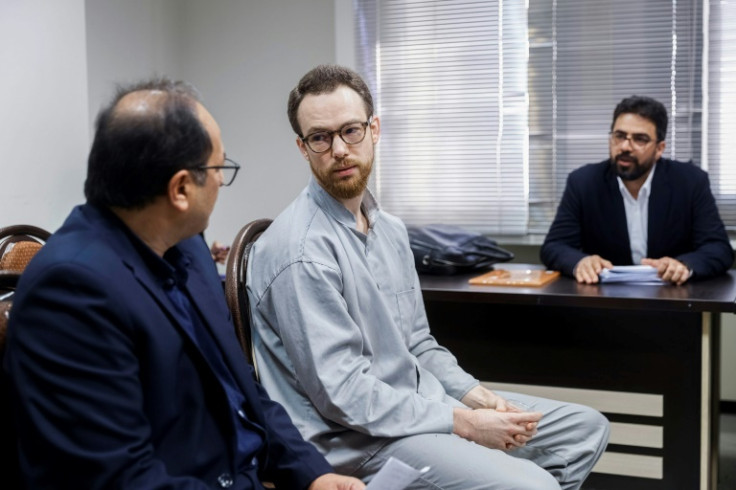
Iran and Sweden announced a prisoner exchange on Saturday that saw a former Iranian official released in Sweden in exchange for a European Union diplomat and a second Swede.
"Hamid Noury, who has been in illegal detention in Sweden since 2019, is free and will return to the country in a few hours," Kazem Gharibabadi, head of Iran's High Council for Human Rights, said in a post on social media platform X.
Shortly afterwards, Swedish Prime Minister Ulf Kristersson said Johan Floderus, an EU diplomat, and a second Swedish national had been released by Iran and were on a flight home.
Floderus, 33, had been held in Iran since April 2022 accused of espionage. He risked being sentenced to death.
Following his release, his father, Matts Floderus, told Swedish news agency TT that the family "are of course terribly happy".
The other Swede, Saeed Azizi, had been arrested in November 2023.
They are on their way home "and will finally be reunited with their relatives", Kristersson said.
Gharibabadi said the release of Noury was thanks to efforts led by late Iranian foreign minister Hossein Amir-Abdollahian, who died in a helicopter crash alongside president Ebrahim Raisi in May.
State media in neutral Oman, which has acted as a mediator between Iran and Western governments in the past, said that following its mediation, the two governments had agreed to the "mutual release" of detained nationals.
"Those released were transferred from Tehran and Stockholm to Muscat today, 15 June 2024, for their repatriation," the official Oman News Agency said.
Noury landed at Tehran's Mehrabad airport at around 5:30 pm (1400 GMT) where he was welcomed by family members and officials including Gharibabadi, state television footage showed
A former Iranian prisons official, Noury was arrested at Stockholm airport in November 2019 and later sentenced to life in prison over mass killings in Iranian jails in 1988.
The 63-year-old thanked the officials and the people of Iran for his release.
He lashed out at the former rebel People's Mujahedin of Iran (MEK) whose activists were instrumental in his prosecution and conviction in Sweden, calling them "traitors who have sold their country."
At least 5,000 prisoners were killed in Iranian jails in 1988 to avenge attacks carried out by the MEK in the closing stages of the Iran-Iraq war when it was fighting alongside Iraqi dictator Saddam Hussein's troops.
The MEK, which remains outlawed as a "terrorist" organisation in Iran, slammed Sweden's decision to release Noury as "shameful and unjustifiable".
He said the exchange would embolden Iran "to step up terrorism, hostage-taking and blackmail".
A Swedish court had found Noury guilty of "grave breaches of international humanitarian law and murder" but he had argued he was on leave during the period in question.
Iran condemned the sentence but Sweden insisted the trial was held under its principle of universal jurisdiction, which allows it to try a case regardless of where the alleged offence took place.
Kristersson said Iran had made Floderus and Azizi "pawns in a cynical negotiation game, with the aim of getting Iranian citizen Hamid Noury released from prison in Sweden".
He added that, as prime minister, he had "a special responsibility for the safety of Swedish citizens. The government has therefore worked intensively on the issue, together with the Swedish security service, which has negotiated with Iran."
Kristersson added: "It has been clear all along that the operation would require some difficult decisions. Now we have made those decisions."
At least two other Swedish citizens remain in custody in Iran, including dual national Ahmad Reza Jalali, who is on death row after being convicted of espionage.
Tehran does not recognise dual nationality.
At least six other Europeans are detained in Iran, from Austria, Britain, France and Germany.
On Thursday, French citizen Louis Arnaud, 36, returned to Paris after spending more than 20 months incarcerated in Iran on national security charges.
Activists and some Western governments accuse Iran of pursuing a strategy of taking foreign nationals as hostages to force concessions from the West.
Last year, Oman helped mediate a swap deal between Iran and the United States, as well as facilitating the release of six European detainees in Iran.







